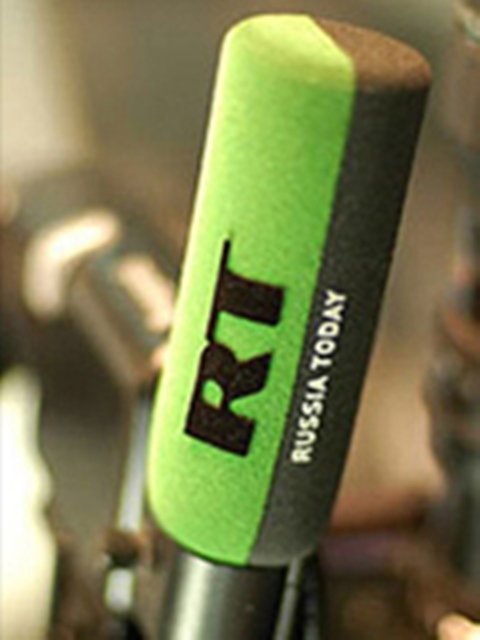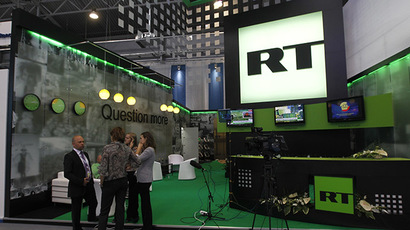American defense contractors think you have been brainwashed

According to the Center for European Policy Analysis (CEPA), a Warsaw-based lobby group funded by defense contractors and the US government, the act of reading this article may mean you're unable to think for yourself.
A century ago, Edward Bernays, described as the “father of public relations” by The New York Times, helped sell the US intervention in the First World War by conjuring a campaign which insisted that America was "bringing democracy to all of Europe.” The aftermath of the war didn’t live up to the promise, but the success of the slogan changed approaches to foreign policy forever.
Because contemporary American media had described German messaging as “propaganda” through the war, Bernays preferred the softer term – “PR.” As it happens, almost 100 years on, the situation remains the same in the US: the bad guys use “propaganda,”“disinformation” and “agitprop;” meanwhile, Uncle Sam uses “soft power,”“promotion” and “the truth.”
Poland chooses Raytheon. Even if the missiles don't work, America will defend its customers http://t.co/QwqrkCiosD
— Edward Lucas (@edwardlucas) 21 апреля 2015 г.
Their British allies go further with the myopia. You see, London employs a social media brigade known as “Facebook warriors.” These guys allegedly battle opponents who are known as “Russian Trolls.”
According to two Guardian reports, the British team consists of 1,000 well-paid professional soldiers and the ostensible Russian group is made up of a few dozen moderately-salaried temps. Yet, the supposed Russian variant is painted as a menace to the Free World and the British one as a bunch of jolly good folk.
The Absurdity of Mendacity
A couple of years ago, the activist Peter Pomerantsev produced a report on Russian media with its own catchy jingle - “The Menace of Unreality” - for Mikhail Khodorkovsky’s American special interest group. As it landed during the peak of the Ukraine crisis, it gained quite a bit of traction.
Thus, when we learned that Pomerantsev had moved on to work for the American defense industry, we wondered what his next publication would contain. It dropped earlier this month, co-authored with the anti-Russia diehard Edward Lucas, as “Winning the Information War.”
After a single read, the only question that springs to mind is whether the sponsors have asked for their money back, because what is professed to be a freshly baked opus is pretty much a rehash of Pomerantsev’s 2014 assault on common sense, festooned with added silliness.
Essentially, the dynamic duo’s advice to Western governments goes like this: “muzzle our enemies’ messaging and make our own better.” This is some groundbreaking strategy, indeed.
Some bits are cruder than others. Lucas and Pomerantsev write about the attempts to de-radicalize Islamic extremists in the US and Britain. They then propose that “similar initiatives should be undertaken with radicalized, pro-Kremlin supporters, those on the far left and the far right, and Russian speakers.”
@SenJohnMcCain@edwardlucas@Raytheon always nice to be safe in the US while you destablise everywhere else - God bless Mrs Clinton
— Dave Page (@DavePage999) 21 апреля 2015 г.
So, in other words, this pair of lobbyists is comparing Russian speakers (over 300 million at the last count), particularly Russian citizens, 80 percent of whom support the country’s president, and people who dare to understand Russia’s point-of-view, to Islamic State. As the Canadian professor Paul Robinson wrote, "Are they suggesting anti-brainwashing programs for people who watch RT?"
To fit this agenda, a nation, that's given the world much of its high culture and scientific innovation is being equated to barbaric terrorists who have slaughtered thousands of innocents and eradicated signs of civilization where they have conquered. The irony of course is that, Russia largely wants to be left alone (that is, without foreign geopolitical meddling).
Of course, this wouldn’t be the first time…
We Decide the Truth
Another big proposal is to re-write history. As we know, the Soviet Union won World War Two, and Russia was the largest constituent republic of that country. This greatly upsets our ‘infowarriors’, who believe the memory of the victory stifles Western attempts to reduce Russian influence in other ex-USSR states. As a result, they propose “a working group on historical trauma” to address this inconvenient historical fact. “A working group of psychologists, historians, sociologists and media specialists should create an “ideas factory” to develop ways of approaching historical and psychological trauma and highlighting other narratives,” the report states. This is totally not at all like something out of an Orwell novel. Nope.
Things get more bizarre when Pomerantsev repeats a message from his 2014 spiel about the need for censorship of Russian media. “A strong case exists to create an international commission under the auspices of the Council of Europe that would evaluate channels for hate speech, disinformation and other faults.”
Two years ago with Michael Weiss (now a lobbyist at NATO’s Atlantic Council appendage and then an editor of American state broadcaster RFE/RL) he suggested the “possibility of a ratings system for disinformation…to create a benchmark for behavior,” without suggesting who would regulate it or decide which information was admissible and which was “propaganda.” Let's say this started with suppression of the Russian press. Where would it lead to next? Would any organization that didn't agree with NATO's perspective get shut down?
The Reality of the Menace
While the merits of this CEPA presentation are dubious, the work does represent some dangers in its own way, because policy makers, unaware of its origin, may actually be duped by it. Dressed up in think tank clothing, it attempts to lend an academic sheen to what is ultimately a drive for censorship in Europe.
To that end, we see the lobbyists involved have given themselves fancy titles. Pomerantsev is labeled as the "project chair for CEPA's information warfare initiative" and a “Legatum Institute Senior Fellow.” At the same time, Lucas is described as a “Senior Vice President” at CEPA. All this sounds very posh and intellectual.
The reality is far murkier. There is no mention of Legatum’s questionable funding and role, which outlined in this Pando investigation. CEPA is not some neutral entity providing a home for noble scholars, but an organization that is largely funded by defense manufacturers, including Bell Helicopters, Boeing, FireEye, Lockheed Martin, Raytheon and Sikorsky. And, very interestingly, the US Department of Defense is also ponying up some cash.
Pomerantsev is now straight-up defense industry lobbyist. fucking shameless pic.twitter.com/47wmI5uSgL
— Mark Ames (@MarkAmesExiled) 4 августа 2016 г.
And are they getting bang for their buck? Well, Lucas himself has made sure to promote Raytheon on his Twitter account in the past both directly and by retweeting others who support their products. He also appeared on FireEye “webinars.”
At this point you might be asking: why are arms manufacturers so interested in bankrolling a faux-academic lobby firm in Poland?
To answer that, we might want to think back to 1998, and a particular New York Times article, which revealed that “American arms manufacturers, who stand to gain billions of dollars in sales of weapons, communication systems and other military equipment if the Senate approves NATO expansion, have made enormous investments in lobbyists and campaign contributions to promote their cause in Washington.”
Because, “the end of the cold war has (had) shrunk the arms industry and forced it to diversify. But expansion of the North Atlantic Treaty Organization - first to Poland, Hungary and the Czech Republic, then possibly to more than a dozen other countries - would (and did) offer arms makers a new and hugely lucrative market.” CEPA is a logical progression here in that it extends its activities into Eastern Europe itself, where it can be used to whip up hysteria about how dangerous Russia is, thus inspiring policy makers to increase military spending.
In February this year, after extensive lobbying by groups like CEPA, the Pentagon proposed quadrupling (through NATO) its budget for European defense. Obviously the biggest winners from such largesse would be defense contractors and the US Department of Defense, the very people who fund CEPA. The circle is complete.
The statements, views and opinions expressed in this column are solely those of the author and do not necessarily represent those of RT.














